 PEN America #13 is themed “Lovers” and features a forum on literary love with contributions from Jessica Hagedorn, John Barth, Yusef Komunyakaa, Stewart O’Nan, Anne Landsman, Sa
PEN America #13 is themed “Lovers” and features a forum on literary love with contributions from Jessica Hagedorn, John Barth, Yusef Komunyakaa, Stewart O’Nan, Anne Landsman, Sa
NewPages Blog
At the NewPages Blog readers and writers can catch up with their favorite literary and alternative magazines, independent and university presses, creative writing programs, and writing and literary events. Find new books, new issue announcements, contest winners, and so much more!
Danticat Interview
 Nathalie Handal interviews Edwidge Danticat in the January 2011 issue of Guernica online: We Are All Going to Die.
Nathalie Handal interviews Edwidge Danticat in the January 2011 issue of Guernica online: We Are All Going to Die.
Spread the word!
Scholarships
The Red Earth MFA Low-Residency Program in Creative Writing at Oklahoma City University is pleased to announce five $1,000 merit scholarships for members of its inaugural class.
All merit scholarships are based on the quality of the writing sample supplied as part of the MFA application. Preference will be given to prospective students who complete their application by March 15. Notification of the scholarships will be mailed and also announced at OCU’s annual Creative Writing Festival on April 16. Scholarships must be applied towards the first year of study in the MFA program.
In addition, the Red Earth program is offering $1,000 tuition reductions in the first year of study for all of its inaugural class. The summer residency is slated for July 6-16. For more information about the program, visit the Web site or contact MFA Director Danita Berg: drberg-at-okcu.edu
Spread the word!
2010 Iowa Review Awards Contest Winners
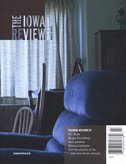 The Winter 2010/11 issue of The Iowa Review features the winners and runners-up of the annual Iowa Review Awards:
The Winter 2010/11 issue of The Iowa Review features the winners and runners-up of the annual Iowa Review Awards:
Fiction
Kathryn Scanlan, “The Old Mill”
Maria Hummel, runner-up
Poetry
HeatherWinterer, “from Art’s Garage“
Jae Choi and Mary Pinard, runners-up
Nonfiction
Deborah Thompson, “Mishti Kukur”
Jendi Reiter, runner-up
Spread the word!
Glimmer Train Short Story Award for New Writers Winners :: January 2011
Glimmer Train has just chosen the winning stories for their Short Story Award for New Writers. This competition is held quarterly and is open to all writers whose fiction has not appeared in a print publication with a circulation greater than 5000. The next Short Story Award competition will take place in February. Glimmer Train’s monthly submission calendar may be viewed here.

First place: Clayton Luz [Pictured], of Chicago, wins $1200 for “When the Wind Blows the Water Grey.” His story will be published in the Spring 2012 issue of Glimmer Train Stories.
Second place: Joseph Johns, of Decatur, GA, wins $500 for “Strange Birds.” His story will also be published in an upcoming issue of Glimmer Train Stories, increasing his prize to $700.
Third place: Jonathan Tucker, of Mwanza, Tanzania, wins $300 for “The Coffin Makers.”
A PDF of the Top 25 winners can be found here.
Deadline soon approaching for the Very Short Fiction Award: January 31
Glimmer Train hosts this competition twice a year, and first place is $1200 plus publication in the journal. It’s open to all writers, no theme restrictions, and the word count must not exceed 3000. Click here for complete guidelines.
Spread the word!
I Read This: Caribou Island
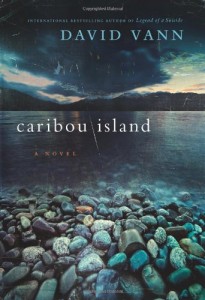 [A time-to-time post on what I’ve been reading lately.]
[A time-to-time post on what I’ve been reading lately.]
Having finished David Vann‘s novel, Caribou Island, I’m still trying to figure out how I can possible forgive this author for writing a novel so compelling I could not stop reading it (or wanting to read it when I couldn’t be), and coming to a finish that was so disturbing it has disrupted my thoughts – both while awake and sleeping – for the past several days. I DON’T recommend this one to anyone already suffering from seasonal affect disorder or cabin fever bordering on The Shining.
A half dozen characters take the lead by chapter for the third person omniscient narration. Irene sees her marriage to Gary coming to an end. Their daughter Rhoda can’t see it coming any more than she can see the fault line in her own engagement to Jim, her cheating fiancee. Other characters move in and out of the story, like storm clouds across the Alaskan sky, and each seems to be the other’s antagonist. In fact, if asked, I’m not sure I could clearly identify a single protagonist in this story. I suppose each character has their moment: Carl, when he finds out Monique is banging Jim and takes of into the cold Alaskan night; Gary as he struggles against the northern snow and wind to build his “dream” island cabin; Irene as she finally sees a doctor who might just help her to understand the cause of the splitting headaches she suffers.
But just as it seems a character is the lead of the plot, breaking away from adversity, each is confronted yet again with an adversary – another of the characters or the unflinching, damnable Alaskan nature.
Vann’s story is an exploration of the human psyche, that which fails us is that which we are and continue to grasp onto. Each character seems to realize this: Gary knows in fits and starts that his cabin is a stupid idea, but he stubbornly persists; Irene knows their marriage is ending, but goes along with the cabin building because she knows they have to play the final card; Rhoda knows her relationship to Jim is nothing more than what she always felt was the right thing to want, whether she feels passionately about it or not. It’s this kind of knowing that makes the writing both so compelling and devastating to read. As much as I would like to see one thing work out well for one character, there are no happy endings here. This is simply a reflection of real life that has its moments of just enough insight to help us accept what we have as good enough and move on. Or not.
Spread the word!
Black River Chapbook Competition Winner
Charlotte Pence has won the Black River Chapbook Competition for her manuscript Branches. Charlotte will receive $500 in prize money and a publication contract from BLP. See a full list of finalists here.
Charlotte Pence is a Ph.D. candidate in creative writing at the University of Tennessee and former editor of Grist: The Journal for Writers. She most recently received the 2009 Discovered Voices award from Iron Horse Literary Journal given to one graduate student in the country for poetry each year. Her work has appeared or is forthcoming in Kenyon Review Online, Prairie Schooner, Southern Review, North American Review, Denver Quarterly, RATTLE, Tar River, and many other journals. She also has an anthology forthcoming with University Press of Mississippi titled Lyrical Traditions: The Intersections Between Poems and Songs.
Spread the word!
Tribute to Robert Von Hallberg
 The Chicago Review (55:3/4) includes a feature of ten essays which mark the retirement of Robert Von Hallberg from the University of Chicago. “They are all by former staff members of Chicago Review, who also completed dissertations under his supervision. The essays all address some aspect of poetry’s relation to power.” The essays include:
The Chicago Review (55:3/4) includes a feature of ten essays which mark the retirement of Robert Von Hallberg from the University of Chicago. “They are all by former staff members of Chicago Review, who also completed dissertations under his supervision. The essays all address some aspect of poetry’s relation to power.” The essays include:
Devin Johnston, “The Needs of Ghosts: On Poems from the Margins of Thom Gunn’s Moly”
Elizabeth Arnold, “The Rhythm of the Actual in Basil Bunting’s ‘Chomei at Toyama'”
Alan Golding, “Louis Zukofsky and the Avant-Garde Textbook”
Mark S. Morrisson, “Ezra Pound, the Morada, and American Regionalism”
Matthias Regan, “Remembering Edward Dorn”
Robert Huddleston, “Myth and Education”
Andrea Scott, “Gerhard Falkner’s Ground Zero“
Lynn Keller, “‘Post-Language Lyric’: The Example of Juliana Spahr”
Peter O’Leary, “Apocalypticism: A Way Forward for Poetry”
Keith Tuma, “After the Bubble”
Spread the word!
Ukrainian Poetry
 The newest issue of International Poetry Review (Fall 2010) is a special issue celebrating twenty-five years of Ukrainian poetry: “This collection of Ukrainian poetry in translation comprises a representative sampling of the poetry created under twenty-five years of creative freedom for Ukrainian writers that began during Soviet premier Mikhail Gorbachev’s policy of “openness” and that has continued to flourish after Ukrainian independence in 1991.” The poetry includes 24 poets in translation, ranging from the oldest writer – Oleh Lysheha (62) to the youngest – Iryna Shuvalova (24).
The newest issue of International Poetry Review (Fall 2010) is a special issue celebrating twenty-five years of Ukrainian poetry: “This collection of Ukrainian poetry in translation comprises a representative sampling of the poetry created under twenty-five years of creative freedom for Ukrainian writers that began during Soviet premier Mikhail Gorbachev’s policy of “openness” and that has continued to flourish after Ukrainian independence in 1991.” The poetry includes 24 poets in translation, ranging from the oldest writer – Oleh Lysheha (62) to the youngest – Iryna Shuvalova (24).
Michael M. Naydan, Woskob Family Professor of Ukrainian Studies, The Pennsylvania State University, provides an introduction to the issue, including a historical overview of the Ukraine poetic movements as well as a memorial to three Ukrainian poets – Attila Mohylny, Ihor Rymaruk, and Nazar Honchar, to whom the issue is dedicated.
Spread the word!
Crazyhorse 50th Anniversary Issue
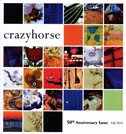 In celebration of its 50th year of continuous publication, Crazyhorse offers readers a “sort of” Editors’ Picks Bonus Anniversary Issue. It includes works from issues edited at College of Charleston in hopes that it will stand as a show of appreciation for all the writers and editors who have come before as well as (“with any luck”) those who will continue the come to the publication.
In celebration of its 50th year of continuous publication, Crazyhorse offers readers a “sort of” Editors’ Picks Bonus Anniversary Issue. It includes works from issues edited at College of Charleston in hopes that it will stand as a show of appreciation for all the writers and editors who have come before as well as (“with any luck”) those who will continue the come to the publication.
Spread the word!
Taking Night to Film
Film School Rejects blogger Cole Abaius names Elie Wiesel’s Night as “one of the three cornerstones of Holocaust literature [that] still hasn’t seen the big screen for an adaptation.” Read his perspective on how it could happen, and who should direct it.
Spread the word!
“[Bleep] the Sonnet” Jennings Says
In the newest issue of Arc Poetry Magazine, Chris Jennings takes on the sonnet in his like-named essay “On the Sonnet.” He begins: “I haven’t dedicated many musty hours to counting rather than reading poems. I’m willing to bet, though, that no one can readily dispute the fact that more poets attempt sonnets, create variants of sonnets, publish sonnets, anthologize sonnets, dive headlong into sequences of sonnets, or come to have their reputation rest on sonnets than any other set form in the English language. This used to intrigue me, then it began to puzzle me, and now it annoys me so much that the right stimulus sends me into a rage. Frankly, I am done with sonnets.”
Arc Poetry Magazine‘s website includes the opening paragraphs of Jenning’s attack of the sonnet form (the end lines of which I can at least say you won’t find repeated on FCC airwaves) – for the full text, you need to get a hold of a copy of Arc.
Spread the word!
Writing Technology into Fiction
Laura Miller of the Guardian.co.uk looks into how novels came to terms with the internet: “We spend hours on the web, but you wouldn’t know that from reading contemporary fiction. Novelists have gone to great lengths – setting stories in the past or in remote places – to avoid dealing with the internet. Is this finally changing?”
Spread the word!
Out of the Mountains
Part of the Ohio University Press’s series in race, ethnicity, and gender in Appalachia, Meredith Sue Willis’s collection of short stories, Out of the Mountains, captures visions of life in the rural hills of West Virginia. The twelve stories contained in this volume offer a full range of emotions, from heavy sadness and defeat to joy and rebirth, as well as a full range of characters and even—remarkable for a book defined by place—a pleasant variety of settings. Continue reading “Out of the Mountains”
Spread the word!
Alphabet of the World
Venezuelan poet and essayist Eugenio Montejo (1938-2008) authored 10 books of poetry, five volumes of “heteronymic” writings (works by imaginary authors), and two books of essays, a large selection of which are brought together here in this thoughtfully edited and translated bilingual book of Selected Works. The University of Oklahoma Press deserves readers’ gratitude and appreciation for publishing the originals alongside their translations (doing so essentially doubles the size of any volume), and for giving us a multi-genre volume (so many presses resist combining genres in a single book). Montejo’s work is preceded by a lengthy, informative, and exceptionally readable introductory essay by editor and translator Kirk Nesset, who provides enough biography and background to contextualize the work, but not so much as to detract from the focus on the poet’s work itself. Nesset’s introduction is appropriate for academic and non-academics alike, intelligent and serious, but free of jargon and written to elucidate, not impress. Continue reading “Alphabet of the World”
Spread the word!
Black Seeds on a White Dish
Dentz’s black seeds and white dishes may refer ostensibly to botany or biology (the phrase appears in “Poem for my mother who wishes she were a lilypad in a Monet painting”), but I can’t help thinking of their Old Testament reverberations, and some of Dentz’s preoccupations certainly support this as a credible reference, most especially “The Night is My Purse, and Here’s Why I Empty Out”: a poem based on the Hebrew alphabet and related numerical system; and “Instead of words, my father blew cinders,” the final line of the opening poem in the collection. How not to imagine the ovens evaded, escaped in those cinders? The fires (black and white) of writing (Old Testament), but also of a history of genocide. Continue reading “Black Seeds on a White Dish”
Spread the word!
Faulkner’s Rosary
At the heart of Sarah Vap’s Faulkner’s Rosary is a sense of conflict, at once extreme yet also subdued. With regard to the book’s overarching musings on maternity and the giving-of-life process, in all its various facets from the visceral to the religious, there is a collision of intense longing, optimism, anxiety, and even violence and aggression. Vap is a master of the unexpected juxtaposition, and she carefully fuses not only the maternal with the spiritual and natural, but also the possibilities of motherhood with a kind of child-like nostalgia and attention to detail. Her narrator recalls at one point her own ejection from the gifted program due to her religious curiosities, an anecdote which sits closely to the book’s core. On a technical level, Vap reveals her chops as well: Continue reading “Faulkner’s Rosary”
Spread the word!
The San Simeon Zebras
C. J. Sage’s The San Simeon Zebras, published by the Irish press Salmon Poetry, is filled with poems as exciting as the animals they portray. The pieces are quirky and gorgeous. Sometimes they become so overexcited with language they fall off the ledges they’re playing on. Continue reading “The San Simeon Zebras”
Spread the word!
Smiles of the Unstoppable
This is a book of poems by a man who has very obviously figured out the formula for casual speech, reconstructed it in his own manic way, and added a few pounds of both humor and serious commentary in the process. Smiles of the Unstoppable is a strange, unique collection that is narrative-driven and conversational. The words are not poetic in nature, really, but the flow, the careful repetitions, and the masterful line-breaks are evidence of a language-commander being behind the helm. The humor pulls the collection together. My favorite bit of humor is towards the end of the book, in a poem called “Night of the Jaguar,” in which Bredle lists a bunch of characteristics people share with jaguars: Continue reading “Smiles of the Unstoppable”
Spread the word!
Otherwise Elsewhere
What is poetry if not, on some level, the embodiment of otherwise and elsewhere? The life beyond the very line that brings it into existence. The place the words evoke, but where they are a placeholder, so to speak. Poetry’s ability, its obligation, perhaps, to evoke what is not there or what is beyond even the concept of “there.” Rivard is preoccupied with otherwise-ness, with elsewhere-ness: “all those lives & destinations that might have been mine, but weren’t— / because there are two kinds of distance between us—towards, & away.” Continue reading “Otherwise Elsewhere”
Spread the word!
When Last on the Mountain
“By the time you’re fifty if you’re in your right mind / you want a divorce from yourself.” Poet Ed Meek pretty well sums up my feelings about it. And similar insights, emotional accuracy, and appealing, understated voices like Meek’s pretty well sums up most of this anthology’s opening lines. Here is Susan Pepper Robbins (“Middle Solutions,” fiction): “‘I told him, I’m not dead yet. You can have them all then, but not now. Not before then.’ Mary turns her head to me, who is not dead yet either, although almost. This year I have lost twenty pounds and gained back thirty, so I’m ten ahead.” And here is Ann Olson (“Coteau, 1969,” nonfiction): “I’m cold. It’s dark. I don’t know where the hell we’re going.” And here is Christina Lovin (“Credo at Fifty-Five”): Continue reading “When Last on the Mountain”
Spread the word!
Life
Sex? Check. Drugs? Check. Rock and Roll? Check. What else would you expect from an autobiography from Rolling Stones co-founder and guitarist Keith Richards called Life? The book has all of these things in abundance, so much so that one could make the argument that they coined the now clichéd phrase for “Keef” himself. There are, however, some welcomed curve balls throughout this book including the Dickensian aspects of a childhood in post war England and references to both Mary Poppins and Master and Commander. Yes, all of that is here and more. Continue reading “Life”
Spread the word!
The Chamber Four Fiction Anthology
Chamber Four is a fledgling operation which has burst onto the scene with all guns blazing. A visit to their site reveals book reviews plus their reviews of other people’s book reviews. There is a section entitled “Great Reads” which includes, among others, a review of the wonderful 1972 novel Watership Down by Richard Adams. There is a section called “The Best Places to Read Online,” and there is the announcement that the magazine is now accepting submissions to publish their own fiction, nonfiction, poetry, and art. But, most interestingly, they have recently published their anthology of the best short stories published on the web in 2009 and 2010. And it is a good one. Continue reading “The Chamber Four Fiction Anthology”
Spread the word!
Milk Dress
Milk Dress has many strengths, exhibiting great poetic control and elegance, but no aspect of the book is more interesting to me than Cooley’s successful linking of “world events” and “bodily/personal events,” her experience of pregnancy, birth, motherhood, illness, loss and birth (rebirth?) again “against” (“Write against narrative” she begins in “Homeland Security,” the opening poem) the events of 9/11, Hurricane Katrina, the daily news, the threat of global disaster. “Write against blankness,” she instructs herself, and, by implication, simultaneously instructs us: read against blankness (“white, white, white”), the empty post-terrorist sky; the empty post-pregnancy crib; the unturned (pre-and-post reading) page. Continue reading “Milk Dress”
Spread the word!
One Island
Tony Hoagland selected One Island for the 2009 Robert Dana Prize for Poetry, and it’s indisputably a winner of a book. Pratt is a masterful poet, although her effectiveness is—in the happiest of ways—difficult to describe. Exploiting poetry’s most powerful and effective strategies (economy of language; unusual syntactical arrangements; unexpected, but comprehensible, combinations of words and phrases; a heightened sense of sound and rhythm, among them), the poet turns the ordinary into the oddly exceptional and, often, the exceptionally odd. The book’s opening line, for starters: “The past is a humidity.” Continue reading “One Island”
Spread the word!
Elegguas
The ten sections of Elegguas are structured around a series of “Letters to Zea Mexican.” I needed to know who she was (the first letter begins with her death, seeing her for the last time) and she wasn’t hard to find. A quick search online turned up summaries and reviews of Brathwaite’s Zea Mexican Diary (1993), an award-winning memoir/diary about the death from cancer in 1986 of his wife, whom he called Zea Mexican, an allusion to her ancestry. The first letter in Elegguas, is, in fact, dated 1986, the year of her death. Brathwaite, who is from Barbados where he still makes his home part-time (he spends the rest of his time in New York where he teaches at NYU), is a prolific and highly regarded writer both in the Caribbean and in the United States. I confess, however, and with no small measure of embarrassment, that I was not familiar with his work until Elegguas, and I found it helpful to learn about his earlier writing to contextualize and understand this book. Continue reading “Elegguas”
Spread the word!
So Quick Bright Things
If some of us want, and many of us do, to read translations in English of work written in other languages, it stands to reason that readers of other languages—Spanish, for example—might want to read poems written originally in English. Wronsky has translated Argentine poet Partnoy’s poetry into English. With So Quick Bright Things / Tan Pronto las Cosas, it’s Partnoy’s turn, beginning with a title (thank you Shakespeare) that’s brilliantly and awfully hard to translate. I applaud Partnoy for her smart, vivid translations of work that is exceptionally difficult to render in another language. Continue reading “So Quick Bright Things”
Spread the word!
Houses are Fields
Houses are Fields joins the fast-growing genre of illness memoirs in verse. (In the last week alone, I’ve encountered no fewer than three such books published in 2010. And I am aware that there are many more.) Silverman’s poems treat the subject of a mother’s brain tumor, exploring relationships between a child and her dying (mother) and well (father) parents; the meaning of death; the nature of illness; and the power—and limits—of memory. Continue reading “Houses are Fields”
Spread the word!
Best Western
Best Western, like previous Gerald Cable Award Book Series winners, is composed almost entirely of narrative poems in accessible and familiar language intended to draw us easily and naturally into their scenes and stories. Gudas is especially adept at creating a credible and almost palpable atmosphere through small, seemingly ordinary detail, and in so doing, heightening his stories’ emotional impact. Each scene becomes, in essence, a minor drama of human experience, often one with which the reader can identify, if not empathize. Continue reading “Best Western”
Spread the word!
2011 Caldecott and Newberry Winners
The 2011 Caldecott Medal winner is A Sick Day for Amos McGee, illustrated by Erin E. Stead, written by Philip C. Stead. A Neal Porter Book, published by Roaring Brook Press, a division of Holtzbrinck Publishing.
Caldecott Honors
Dave the Potter: Artist, Poet, Slave illustrated by Bryan Collier, written by Laban Carrick Hill, published by Little, Brown and Company, a division of Hachette Book Group, Inc.
Interrupting Chicken illustrated and written by David Ezra Stein, published by Candlewick Press.
The 2011 Newbery Medal winner is Moon over Manifest by Clare Vanderpool, published by Delacorte Press, an imprint of Random House Children’s Books, a division of Random House, Inc.
Newberry Honors
Turtle in Paradise written by Jennifer L. Holm, published by Random House Children’s Books, a division of Random House, Inc.
Heart of a Samurai written by Margi Preus, published by Amulet Books, an imprint of Abrams.
Dark Emperor and Other Poems of the Night written by Joyce Sidman, illustrated by Rick Allen, published by Houghton Mifflin Books for Children, Houghton Mifflin Harcourt.
One Crazy Summer written by Rita Williams-Garcia, published by Amistad, an imprint of HarperCollins Publishers.
Spread the word!
Closings :: The Mystery Bookstore (CA)
The Mystery Bookstore in Los Angeles, CA, will be closing, effective January 31, 2011.
Spread the word!
Tin House eMakeover
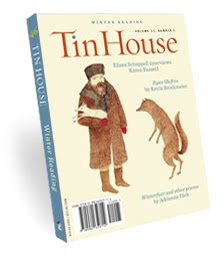 Tin House has a new web design, including Submishmash for online submissions and eBook versions in both the ePub (iPad, Sony eReader, B&N Nook) and MobiPocket (Kindle) formats “wherever possible,” and, on the magazine side, featuring the full text of several stories, poems, essays, and interviews.
Tin House has a new web design, including Submishmash for online submissions and eBook versions in both the ePub (iPad, Sony eReader, B&N Nook) and MobiPocket (Kindle) formats “wherever possible,” and, on the magazine side, featuring the full text of several stories, poems, essays, and interviews.
Spread the word!
Helping Out Those Down Under
 Australian poet Graham Nunn created the Ocean Hearted Flood Relief Project to raise funds for flood relief in QLD (Queensland, Australia). Here’s his plan:
Australian poet Graham Nunn created the Ocean Hearted Flood Relief Project to raise funds for flood relief in QLD (Queensland, Australia). Here’s his plan:
From January 12 to January 26 Nunn will donate 100% of all sales of his book Ocean Hearted to flood relief and “to add to that, I will personally give an extra $5 for every book sold.” Copies of Ocean Hearted can be purchased for $15 (incl. postage) via paypal or check/money order.
Visit his blog for more details.
All monies will be given to the Premiers Disaster Relief Appeal, a Queensland Government established Distribution Committee that includes representatives from the Australian Red Cross to manage the disbursement of the donated funds.
Spread the word!
Call for Guest Editors
Status Hat Productions is currently seeking guest editors for the SUMMER 2011 (3 issues) and FALL 2011 (3 issues) editions of their monthly artszine, STATUS HAT!
Editors will be responsible for 3 issues of STATUS HAT, for either the Summer or Fall quarter. SHP seeking editors with diverse backgrounds in the arts, as our editors do not work in one area, but select visual content, fiction, non-fiction and poetry, as well as seek out additional content or explorations of themes as necessary to create engaging issues of Status Hat.
Guest editors must be able to commit to reviewing and selecting submissions for their assigned issues over a 3 month period prior to the quarter (Summer or Fall, 2011) they are working on, and demonstrate excellent communication skills.
Contact editor-at-statushat.org with an inquiry by January 31, 2011. Please have “GUEST EDITOR INQUIRY” in the subject line of your email.
Spread the word!
Singleton and Weales Featured
 The Winter 2010 issue of The Georgia Review offers two special features: one on George Singleton and one on Gerald Weales.
The Winter 2010 issue of The Georgia Review offers two special features: one on George Singleton and one on Gerald Weales.
The Singleton feature includes two stories, “Vaccination” and “Jayne Mansfield,” which, Editor Stephen Corey notes brings the total number of Singleton stories published by TGR to 11 – putting him “at the head of the quantity class for our fiction writers.” But, more importantly, Corey notes, these two selections “show one of America’s best seriocomic authors at the height of his varied strengths.” Also included in the Singleton feature is “A Holy Impropriety: the Stories of George Singleton” by William Giraldi.
The Weales feature includes “Being Out Front at American Theater: An Interview with Gerald Weales” by Stephen Corey and “American Theater Watch, 1977-2010” – excerpts from decades of Weales annual feature. Corey introduces these selections he made from over 400 pages of Weales’s contributions to the magazine.
Spread the word!
New at AWP 2011 – Women’s Caucus
AWP Conference: The Women’s Caucus, led by Lois Roma-Deeley, Patricia Smith, Cheryl Dumesnil, Anna George Meek, Amy King, and Katherine Arnoldi, is scheduled to meet for the first time on Saturday, February 5 from 10:30 AM to 11:45 AM in the hotel Mezzanine Le.
Lois Roma-Deeley sent the following description: “Where is the place for the women writer within AWP and within the greater literary community? The women’s caucus discusses this as well as continuing inequities in creative writing publication and literature. In addition, issues centering on cultural obstacles in the form of active oppression, stereotypes, lack of access to literary power structures, historical marginalization of women’s writing, issues and perspectives and the diverse voices of women will explored. Networking opportunities.”
The mission of the AWP Women’s Caucus is the following:
–to expand networking opportunities for women writers
–to recognize the contributions of women writers nationally and internationally
–to enhance understanding of the relationship between gender and creative writing
–to expand literary and cultural dialogue to encompass all genres of creative writing specific to women writers
–to encourage an open forum for dialogues about feminist literary perspectives
–to support education about the contributions of women writers
–to support women writers on local, national, and global levels
–to advocate for equity in creative writing for all
Spread the word!
Job :: Poetry Inside Out Outreach Manager
The Center for the Art of Translation is seeking an Outreach Manager to help place their Poetry Inside Out program in Bay Area, CA schools.
The PIO Outreach Manager works as part of a team to accomplish a number of goals and objectives for the Center. They include:
• Plan the growth and implementation of the program.
• Build relationships with school administrators, districts, teachers, professional organizations, and students and their families.
• Create new systems and revise existing ones for overall program efficiency and documentation.
• Promote opportunities for collaboration with other organizations.
• Oversee and promote PIO public events.
• Assist the PIO staff with defining the goals for and expanding the various PIO curriculum.
• And act as an ambassador of the program and the Center.
For a complete job description and instructions on how to apply, visit PIO’s Get Invovled page.
Spread the word!
ABRAXAS – 2010
ABRAXAS describes itself as an “irregular, independent poetry magazine” from Wisconsin and introduces readers to contemporary writers of lyrical poetry. Continue reading “ABRAXAS – 2010”
Spread the word!
AMERARCANA – 2010
As child I remember singing, “This land is your land, this land is my land. From California to the New York Island […] This land was made for you and me.” Like Woody Guthrie’s famous song, the Amerarcana brilliantly encompasses a broad spectrum of voices that represents the collective identity of American poets from coast to coast. The Amerarcana is a rich steaming stew of folklore, language, and cultural identity. Piping hot and savory too! Each poem is a tantalizing slice of western spirit. Continue reading “AMERARCANA – 2010”
Spread the word!
Amoskeag – Spring 2010
From the unknown writer expecting a rejection letter, rather than a publication, to authors well-known to the New York Times—all meet together in Amoskeag. This collection of voices focuses on what Editor Michael J. Brien expresses as, “recollections and reconstructions of hazy, distant memories, and memories so fresh they scream to be captured before they begin to […] lose breath.” Continue reading “Amoskeag – Spring 2010”
Spread the word!
Crab Creek Review – 2010
After winning a year’s subscription during last year’s National Poetry Day, I discovered the joy of the Crab Creek Review. What had drawn me into past issues was the range of voices, both from experienced writers and fresh, emerging writers. There has always been a certain charm to the pieces selected, whether their tone leans towards the more serious or whimsical, and this issue is no exception. Continue reading “Crab Creek Review – 2010”
Spread the word!
Feile-Festa – Spring 2010
Feile and festa mean “festival” in Irish and Italian, and indeed there are many pieces in this journal from the Mediterranean Celtic Cultural Association worth celebrating. Much of the work explores the effects of Irish and Italian diaspora in the United States, particularly New York City. Continue reading “Feile-Festa – Spring 2010”
Spread the word!
Field – Fall 2010
Bruce Weigl, Annie Finch, Steve and Stuart Friebert, David Young, Beckian Fritz Goldberg, Carole Simmons Oles, and Stephen Tapscott contribute to “A Symposium” on poet Richard Wilbur, in anticipation of his 90th birthday, with essays responding to particular Wilbur poems, reprinted here. These thoughtful essays of close reading, and Wilbur’s “consistently brilliant” poetry (as aptly categorized in the editors’ introduction), are well accompanied by new work from David Dodd Lee, David Wagoner, Elton Glaser, Jon Loomis, Kimiko Hahn, and Sandra McPherson, among others. Continue reading “Field – Fall 2010”
Spread the word!
Jubilat – 2010
Uljana Wolf’s work, translated by Susan Bernofsky, excerpts from DICTHionary. A German-English Dictionary of False Friends, True Cognates, and Other Cousins, is like the best of the work jubilat always gives us, inventive, unusual, confusing, smart, and full of itself—always in the best sense. Here, dictionary letters and their representative words are followed by prose poems that play out the letters in clever streams of connected and disconnected images and opinions. Continue reading “Jubilat – 2010”
Spread the word!
Knockout Literary Magazine – Spring 2010
Simply put, the collection of poems in Knockout Literary Magazine is breathtaking. This edition includes a wide variety of topics such as suicide, oppression against homosexuality, and love (straight and queer). In its third volume, the heavy-hitting journal presents forty astounding poets, who make their way to the page bringing dark imagery, fearless honesty, and fresh voices, including Jeff Mann, Robert Walker, Joseph Massey, Jim Tolan and Ronald H. Bayes. Knockout also features translations from Dag T. Straumsvag, Yannis Ritsos, Harry Martinson, Jesus Encinar, and Olav H. Hauge. Continue reading “Knockout Literary Magazine – Spring 2010”
Spread the word!
Poet Lore – Fall/Winter 2010
The cover of Poet Lore is wondrous, a photograph of ice skaters posing for the camera on Mirror Lake in Yosemite in 1911. The Editor’s Page describes the photo as an appropriate introduction to the issue’s work with its—unanticipated—focus on winter as metaphor. The photo’s technical and artistic qualities are, to my mind, the finest metaphor for poetry, or, perhaps, an apt metaphor for fine poetry—making the real seem both more and less real than seemed possible, drawing what is far-off into close view and moving what is right in front of us into the background. The photo is clear in its misty-ness and misty in its clarity, like much of the poetry in this issue. Continue reading “Poet Lore – Fall/Winter 2010”
Spread the word!
Slipstream – 2010
This issue is a beautifully composed collection of poetry and black-and-white photography commemorating the thirtieth anniversary of Slipstream Magazine. Elegant, hauntingly surreal images by David Thompson and Lauren Simonutti, interspersed among the poetry, compliment perfectly the magazine’s tone. Poems contributed by authors from walks of life ranging from the academic to the janitorial present a similarly diverse range of perspectives, yet the poems feel like they were meant to be published together. The collection flows seamlessly from beginning to end in a way that makes reading it in its entirety not only easy to do, but extraordinarily rewarding as well. Continue reading “Slipstream – 2010”
Spread the word!
The Tusculum Review – 2010
The Tusculum Review plunges into an odyssey of self-reflection, confession, and recollection. The review calls itself, “an annual venue for new voices,” and each voice within its pages is entirely unique from its counterparts. The sampling highlights a fusion of character voices within the short stories, drama, poetry, and illustrations; each piece retains a beautifully rendered resonance to its own statement. Continue reading “The Tusculum Review – 2010”
Spread the word!
World Literature Today – November-December 2010
Every glorious issue of World Literature Today is an argument for print! There is simply no way to duplicate the experience as cyber reading. This is not to say that you might not want to try “Zinio,” the virtual magazine-reading option for WLT. But, for my money (and it’s only $4.95 on the newsstand!) there is no way it could duplicate the feel of the glossy paper, the vibrancy of the large and small format color and black and white photos, the clarity of the illustrations (maps), or the smartly designed pages. This issue’s special section is on India, and the gorgeous, beautifully reproduced full-color, full-bleed photograph that opens the section, “Girl in Red Slippers by the Blue Door,” the work of guest editor and poet Sudeep Sen of New Dehli, is hard to picture on a small screen.
Continue reading “World Literature Today – November-December 2010”
Spread the word!
Native American Voices in Art and Literature Online
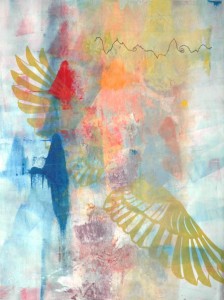 Issue #4 of the online lit mag Ekleksographia is a special issue: The Emerging Native American Voices, guest Curated by Ann Filemyr and Jamie Figueroa.
Issue #4 of the online lit mag Ekleksographia is a special issue: The Emerging Native American Voices, guest Curated by Ann Filemyr and Jamie Figueroa.
In the introduction, Ann Filemyr writes: “Twenty-first century Native American literature is vibrant and evolving. It invites us into the creative lives and ideas of writers whose cultures are demonstrating an incredible capacity for cultural survivance against all odds.”
Art, poetry, and prose contributors include: Ungelbah Daniel-Davila, Anna Nelson, Ruben Santos, Paige Buffington, Nathan Romero, Vernon Begay, Sara Marie Ortiz, Alice M. Azure, Ann Filemyr, Jamie Figueroa, Celeste Adame, Autumn Gomez, Evelina Zuni Lucero, and Marcia Smith.
Cover Image: “Timeless” by Marcia Smith
